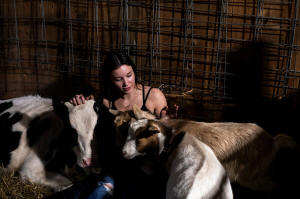How bird flu could threaten cow cuddling. Yes, it is a thing.
 Send a link to a friend
Send a link to a friend
 [May 04, 2024]
By P.J. Huffstutter [May 04, 2024]
By P.J. Huffstutter
MONEE, Illinois (Reuters) - Farmer Luz Klotz straightened the brightly
striped hair bow on Reba, a 1,600-pound heifer lounging on the ground
under twinkling fairy lights. Teenager Joey Pachl, hoping to impress his
girlfriend with an invitation to the high school prom, had paid $75 for
an hour-long cow cuddling session at the farm.
Pachl successfully wowed animal loving girlfriend Emma. For Luz and
husband Dan Klotz, such visitors have become key to covering the feed
bills and keeping their small farm running.
Paying farmers to snuggle up with half-ton heifers is all the rage in
the United States thanks to social media. For visitors, cuddling dairy
or beef cattle can be therapeutic, or simply an adventure for city
dwellers looking for good old country fun.
But this practice of opening the barn door to the public is facing a new
risk, as the U.S. Department of Agriculture (USDA) confirmed bird flu in
dairy herds in nine states.
Scientists have said the outbreak is likely more widespread across the
nation's more than 26,000 licensed dairy farms based on findings of H5N1
particles in about 20% of milk samples. One Texas dairy worker tested
positive for the virus, and the U.S. Centers for Disease Control and
Prevention (CDC) have monitored more than 100 people who have been
exposed.

Government officials say the risk of human infection is low. But state
and federal government officials are urging cattle and dairy farmers to
limit outside visitors as much as possible.
In Michigan, where one dairy herd has tested positive, the head of the
state's agriculture department this week signed an emergency response
order with new sanitation measures and access limitations to dairy and
commercial poultry farms starting May 8.
The order does not expressly prohibit cow cuddling. But Michigan
Department of Agriculture and Rural Development director Tim Boring told
Reuters, "From a human to animal health standpoint, now is not a good
time to cuddle cows. This is to protect the cows and people."
Any restrictions could pose economic trouble for small family farms that
rely on cow-cuddling and other agritourism practices to provide a
financial lifeline. Cow cuddling sessions at the De Vor Dairy Farm and
Creamery in northern Michigan book up weeks in advance and cover the
farm's insurance bill.
"I'm not worried about bird flu, because the farm is already open to the
public and we already have safety measures in place," said farmer Henk
De Vor.
Luz and Dan Klotz in Illinois, who own Luz Farms, also have protective
measures in place to ensure the safety of their visitors and to keep
their farm operating. One hour of cow cuddling pays for one bale of hay
- enough to keep their small herd fed for a week.
"It helps a lot," Dan Klotz said.
Weekend sessions at Clarksville Cow Cuddling, at Mary's Land Farm in
Maryland, are booked for the next two months. Demand also is high at The
Cuddle Corral in Arizona, the Texas Gaushala farm in Texas and the
Sunset View Creamery in New York, farmers said.
[to top of second column]
|

Emma Maiers sits with cows and goats during a cow cuddle session at
Luz Farms near Monee, Illinois, U.S. April 15, 2024. REUTERS/Jim
Vondruska
 From yoga classes with baby goats
and feeding baby piglets, to corn mazes and you-pick sunflower
fields, more than 28,600 U.S. farms offered agritourism or
recreational services of some sort on their land in 2022 –
generating $1.26 billion in income, 32% more than 5 years earlier,
USDA data shows.
Such revenue streams are key right now: U.S. farm incomes are
expected to take the biggest plunge in 18 years as crop prices
slump, USDA data shows, and small farms are especially hurting.
"Agritourism is a real economic driver for small farmers who have
found a niche," said Curt Covington, senior director of institution
credit at AgAmerica Lending.
SHE MEANT YES
Bird flu has spread from migratory birds to dozens of species
globally, concerning public health experts. USDA believes the virus
is spreading among cattle primarily through contact with raw milk,
Rosemary Sifford, the agency's chief veterinary officer said on a
media call.
While USDA has not publicly named the dairies where cows tested
positive, the agency told Reuters the size of affected dairy farms
ranges from 300 to 23,000 head.
"Regardless of the size of operation, all dairy producers should
re-double biosecurity efforts and be vigilant about monitoring for
and controlling disease in their herds," a spokesperson for USDA's
Animal and Plant Health Inspection Service said in a statement.
Cow-cuddling hosts say they take steps to ensure the safety of
visitors and their animals.
It was Linda Pachl, Joey's mom, who first saw a post about Luz
Farms' cow snuggle sessions on Facebook – and suggested the idea to
her son. Joey asked the farmers if they could make up a banner in
Emma's school colors that said, "Prom?"
A week later, as country music crooned over the barn's battered
radio, the banner was slung over the body of Yogi, a calf on the
farm. Pachl nudged girlfriend Emma Maiers' shoulder. "Well?" he
asked.
"I love cows!" squealed Maiers, 16. Pachl grinned. Not exactly the
answer he was expecting, but he figured she meant yes.
(Additional reporting by Tom Polansek in Chicago and Lisa Baertlein
in Los Angeles; Editing by Caroline Stauffer and Diane Craft)
[© 2024 Thomson Reuters. All rights reserved.]This material may not be published,
broadcast, rewritten or redistributed.
Thompson Reuters is solely responsible for this content.
 |